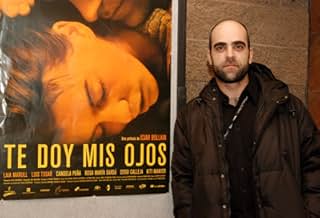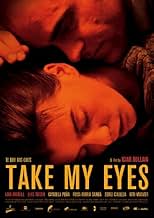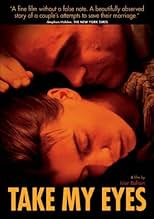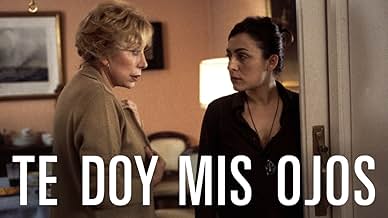CALIFICACIÓN DE IMDb
7.4/10
7.8 k
TU CALIFICACIÓN
Pilar huye de casa una noche de invierno. Solo se lleva con ella unas pocas pertenencias y a su hijo, Juan. Antonio no tarda en empezar a buscarla. Dice que Pilar es su sol y que, además, le... Leer todoPilar huye de casa una noche de invierno. Solo se lleva con ella unas pocas pertenencias y a su hijo, Juan. Antonio no tarda en empezar a buscarla. Dice que Pilar es su sol y que, además, le ha dado sus ojos.Pilar huye de casa una noche de invierno. Solo se lleva con ella unas pocas pertenencias y a su hijo, Juan. Antonio no tarda en empezar a buscarla. Dice que Pilar es su sol y que, además, le ha dado sus ojos.
- Dirección
- Guionistas
- Elenco
- Premios
- 42 premios ganados y 17 nominaciones en total
Rosa Maria Sardà
- Aurora
- (as Rosa María Sardá)
Kiti Mánver
- Rosa
- (as Kiti Manver)
David Mooney
- John
- (as Dave Mooney)
- Dirección
- Guionistas
- Todo el elenco y el equipo
- Producción, taquilla y más en IMDbPro
Opiniones destacadas
This movie takes a brutally honest approach at the tragic reality of spousal abuse. This topic has been addressed before, but this movie deals with the subject matter better than any other I can recall seeing.
An effective performance by Luis Tosar, as the abusive husband Antonio, develops the layers of emotions in this imposing and frightening character in an effort to understand why this violence is occurring. While certainly not presenting an advocate's position to defend his cruel and vicious behavior, the film also resists the temptation of exploiting the volatile outbreaks. The film shows degrading speech and physical battery to the wife, while not going overboard with bloody, gory attack just for their own sake. He attends support groups to discuss with a psychologist and other abusers the root causes of the action, and makes a sincere effort to change his ways. Gradually, the motivations for his irrational action, although becoming clearly understood, are still properly advanced as totally unacceptable.
Laia Marull, as the abused wife, is not stereotyped, either. She is shown as an intelligent and capable person, making an honest effort to confront the situation, while struggling with the conflict of somehow preserving the marriage. There are many artistic metaphors about the passion of their marriage reflecting the very problem they are dealing with. I also like the wife's museum tour presentations, where she is clearly talking not only of the paintings, but of her own aspirations. Both of the principals are splendid in their roles, especially in their interaction with one another.
Much could be written of the rich double-layered symbolism of several other scenes. Suffice it to say this is a beautifully done movie with an ending, that in all its simplicity, took me by surprise. It was the proper ending, too, I think, for reasons you will understand when you see the movie. Definitely worth viewing.
An effective performance by Luis Tosar, as the abusive husband Antonio, develops the layers of emotions in this imposing and frightening character in an effort to understand why this violence is occurring. While certainly not presenting an advocate's position to defend his cruel and vicious behavior, the film also resists the temptation of exploiting the volatile outbreaks. The film shows degrading speech and physical battery to the wife, while not going overboard with bloody, gory attack just for their own sake. He attends support groups to discuss with a psychologist and other abusers the root causes of the action, and makes a sincere effort to change his ways. Gradually, the motivations for his irrational action, although becoming clearly understood, are still properly advanced as totally unacceptable.
Laia Marull, as the abused wife, is not stereotyped, either. She is shown as an intelligent and capable person, making an honest effort to confront the situation, while struggling with the conflict of somehow preserving the marriage. There are many artistic metaphors about the passion of their marriage reflecting the very problem they are dealing with. I also like the wife's museum tour presentations, where she is clearly talking not only of the paintings, but of her own aspirations. Both of the principals are splendid in their roles, especially in their interaction with one another.
Much could be written of the rich double-layered symbolism of several other scenes. Suffice it to say this is a beautifully done movie with an ending, that in all its simplicity, took me by surprise. It was the proper ending, too, I think, for reasons you will understand when you see the movie. Definitely worth viewing.
"Take My Eyes (Te doy mis ojos)" is a frank, classy woman in jeopardy/Lifetime TV for Women film.
A couple of elements raise it above Hollywood's unfortunately already tired treatment of abused wives in such films as "Sleeping with the Enemy" or "Enough", among many others.
First is the superb acting by Laia Marull as "Pilar". Her transformation from frightened mouse to tentative independent to an expressive person with a back bone is riveting. She does look distractingly like Annabella Sciorra, but that means she is beautiful and very womanly.
Second is the emphasis less on the physical violence by an abuser that American films revel in (this film opens right after such an incident) than on the psychological impact, both on abuser and victim. Even amidst strife, this is a passionate couple who were very much in love, though we get hints from the beginning that he was controlling, as in the conversations that include the titular phrase. Unlike Hollywood, her final revenge is not violent but in how she uses those words back at him.
Uniquely, we see the husband (Luis Tosar as "Antonio" looking distractingly like the Irish actor James Nesbitt) as a 360 degree person, with his own family stresses, and not just as the usual evil incarnate. Though we don't see how he got into anger-management therapy sessions for abusers that in the U.S. are usually only a result of a court-order and I couldn't tell from the untranslated credits what experts were consulted for these recreations, they are a fascinating look at an attempt to change abusive behaviors. The shrink finds he has to teach these guys even how to have a conversation with their wives to prevent triggers, let alone what to do when rage starts filling their heads.
Another difference is that while the husband jealously fixates on the possibility of her finding a new lover, a sensitive new age guy character invariably appears in the Hollywood versions (and it was entertainingly non-stereotypical that the Scottish brother-in-law is held up as a prized alternative), the threat to his marriage actually comes from her relationships with the women in her life, from family to friends. Through them she becomes more attuned to humiliation as violence than even her hospital records filled with lied about fractures. It was a bit much symbolically to have her suddenly get into artistic presentations of ancient sexy myths, though it was nice that the credits identified each of the paintings discussed.
While sadly this is a familiar story in filmed outline, the film is continually suspenseful and involving as to what they will do, together and apart.
A couple of elements raise it above Hollywood's unfortunately already tired treatment of abused wives in such films as "Sleeping with the Enemy" or "Enough", among many others.
First is the superb acting by Laia Marull as "Pilar". Her transformation from frightened mouse to tentative independent to an expressive person with a back bone is riveting. She does look distractingly like Annabella Sciorra, but that means she is beautiful and very womanly.
Second is the emphasis less on the physical violence by an abuser that American films revel in (this film opens right after such an incident) than on the psychological impact, both on abuser and victim. Even amidst strife, this is a passionate couple who were very much in love, though we get hints from the beginning that he was controlling, as in the conversations that include the titular phrase. Unlike Hollywood, her final revenge is not violent but in how she uses those words back at him.
Uniquely, we see the husband (Luis Tosar as "Antonio" looking distractingly like the Irish actor James Nesbitt) as a 360 degree person, with his own family stresses, and not just as the usual evil incarnate. Though we don't see how he got into anger-management therapy sessions for abusers that in the U.S. are usually only a result of a court-order and I couldn't tell from the untranslated credits what experts were consulted for these recreations, they are a fascinating look at an attempt to change abusive behaviors. The shrink finds he has to teach these guys even how to have a conversation with their wives to prevent triggers, let alone what to do when rage starts filling their heads.
Another difference is that while the husband jealously fixates on the possibility of her finding a new lover, a sensitive new age guy character invariably appears in the Hollywood versions (and it was entertainingly non-stereotypical that the Scottish brother-in-law is held up as a prized alternative), the threat to his marriage actually comes from her relationships with the women in her life, from family to friends. Through them she becomes more attuned to humiliation as violence than even her hospital records filled with lied about fractures. It was a bit much symbolically to have her suddenly get into artistic presentations of ancient sexy myths, though it was nice that the credits identified each of the paintings discussed.
While sadly this is a familiar story in filmed outline, the film is continually suspenseful and involving as to what they will do, together and apart.
8Nzup
There are for sure many other films dealing with domestic violence, but I bet no one is better than this one.
This is something that is said to happen quite often in Spain and the movie was shot in order to sensitize people for this issue and to bring to talk about it. It is the story of an ill jealous man, full of complex of inferiority, terrorizing his wife and son.
I loved the love scene between both, where he makes her repeat that she gives all her body to him (Te doy mis ojos, te doy mi boca etc.). It shows perfectly the mental state of the husband who sees his wife as his property.
This was as well an excellent performance of Laia Marull and Luis Tosar.
This is something that is said to happen quite often in Spain and the movie was shot in order to sensitize people for this issue and to bring to talk about it. It is the story of an ill jealous man, full of complex of inferiority, terrorizing his wife and son.
I loved the love scene between both, where he makes her repeat that she gives all her body to him (Te doy mis ojos, te doy mi boca etc.). It shows perfectly the mental state of the husband who sees his wife as his property.
This was as well an excellent performance of Laia Marull and Luis Tosar.
One of the first negative responses the critics give about the Academy Award is how there is only one award for the rest of the world, that is, Best Foreign Film.
I do like Hollywood films and in fact, about 80% of the movies I watch are Hollywood movies. But this time I am going to write about a Spanish film originally entitled "Te Doy Hasta Mis Ojos", which translates into "Take my Eyes".
The movie is directed by Iciar Bollaín and stars Luis Tosar as Alfonso and Laia Marull as Pilar.
The movie's beginning might as well be a suitable ending with, a determined Pilar and her son running away from home to refugee at Pilar's sister, Ana's house.
The reason and main theme of the movie are soon revealed, Pilar is beaten by her psychotic husband, Alfonso. We then start understanding the difficult, but yet common, couple relationship they live through.
Pilar and Alfonso both love and need each other, which is the main reason why Pilar returns with him. Unfortunately, there are other factors affecting Alfonso, whom even though is attending an anger management program, has several outbursts of anger.
Being the black sheep of his siblings, being at a work he dislikes, and not liking Pilar's new job, which is making him insecure of her faithfulness. The truth is Pilar is only enthusiastic about doing something she likes, her husband misunderstand this leading to the mental disturbing final act.
If I had to briefly describe this movie, I will probably say "Cruelly Real". An uncomfortable feeling is always present. Making you willing to just stop the movie, but at the same time, gluing you to your seat until its ending.
The characters are really well portrayed and even though you feel no sympathy at all for Alfonso, you still try to comprehend the reasons behind his behavior.
I will like to advice it is a really heavy movie but it is surely recommendable, since this is a problem found in societies all around the world, and this movie portrays what a family under this conditions has to live through.
I do like Hollywood films and in fact, about 80% of the movies I watch are Hollywood movies. But this time I am going to write about a Spanish film originally entitled "Te Doy Hasta Mis Ojos", which translates into "Take my Eyes".
The movie is directed by Iciar Bollaín and stars Luis Tosar as Alfonso and Laia Marull as Pilar.
The movie's beginning might as well be a suitable ending with, a determined Pilar and her son running away from home to refugee at Pilar's sister, Ana's house.
The reason and main theme of the movie are soon revealed, Pilar is beaten by her psychotic husband, Alfonso. We then start understanding the difficult, but yet common, couple relationship they live through.
Pilar and Alfonso both love and need each other, which is the main reason why Pilar returns with him. Unfortunately, there are other factors affecting Alfonso, whom even though is attending an anger management program, has several outbursts of anger.
Being the black sheep of his siblings, being at a work he dislikes, and not liking Pilar's new job, which is making him insecure of her faithfulness. The truth is Pilar is only enthusiastic about doing something she likes, her husband misunderstand this leading to the mental disturbing final act.
If I had to briefly describe this movie, I will probably say "Cruelly Real". An uncomfortable feeling is always present. Making you willing to just stop the movie, but at the same time, gluing you to your seat until its ending.
The characters are really well portrayed and even though you feel no sympathy at all for Alfonso, you still try to comprehend the reasons behind his behavior.
I will like to advice it is a really heavy movie but it is surely recommendable, since this is a problem found in societies all around the world, and this movie portrays what a family under this conditions has to live through.
The best I can say in favor of this film is that I came out of the cinema with terrible back pain because I had been so extremely tense while watching it. The actors are absolutely brilliant, communicating all that needs to be told, and the plot is never simplistic.
Most European social cinema seems influenced by Ken Loach's movies and this one is no exception. The way time passes slowly and characters try hard to improve their situation reminds a lot of Loach's "Sweet Sixteen", among others.
If there is any weakness to the movie is that I can't say if people who do not share the director's opinions on gender violence would appreciate this movie as much as I have.
Most European social cinema seems influenced by Ken Loach's movies and this one is no exception. The way time passes slowly and characters try hard to improve their situation reminds a lot of Loach's "Sweet Sixteen", among others.
If there is any weakness to the movie is that I can't say if people who do not share the director's opinions on gender violence would appreciate this movie as much as I have.
¿Sabías que…?
- TriviaLaia Marull said her role in this film is the one that has marked her career the most. "It was a very intense movie. I remember the scene in which my character is undressed by his partner and urinates on the balcony. It was a very emotional scene. Working with Luis Tosar is very easy because you look into his eyes and he gives you everything," Marull said. For his part, Tosar revealed a secret about that scene: "When we filmed the scene on the balcony, in which she pees on herself out of fear, I remember being with a sponge between her legs, helping her squeeze it so that the trickle would fall out."
- ConexionesReferenced in Spanish Movie (2009)
- Bandas sonorasFarewell To Gibraltar
Canción popular escocesa
Selecciones populares
Inicia sesión para calificar y agrega a la lista de videos para obtener recomendaciones personalizadas
- How long is Take My Eyes?Con tecnología de Alexa
Detalles
- Fecha de lanzamiento
- País de origen
- Sitio oficial
- Idioma
- También se conoce como
- Take My Eyes
- Locaciones de filmación
- Productoras
- Ver más créditos de la compañía en IMDbPro
Taquilla
- Total en EE. UU. y Canadá
- USD 30,496
- Fin de semana de estreno en EE. UU. y Canadá
- USD 6,440
- 19 mar 2006
- Total a nivel mundial
- USD 6,098,633
- Tiempo de ejecución
- 1h 49min(109 min)
- Color
- Mezcla de sonido
- Relación de aspecto
- 1.85 : 1
Contribuir a esta página
Sugiere una edición o agrega el contenido que falta

![Tráiler [OVS]](https://m.media-amazon.com/images/M/MV5BNDFiNzRhYTMtODVmNy00OWQ0LTkwMzAtYjRiNGZmNTk4YjhhXkEyXkFqcGdeQXRyYW5zY29kZS13b3JrZmxvdw@@._V1_QL75_UX500_CR0)































